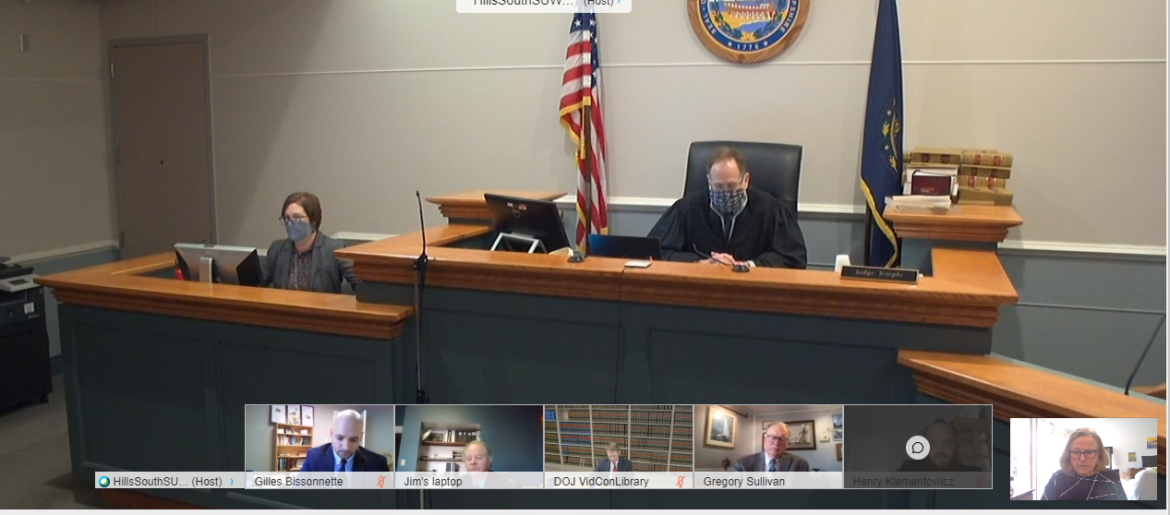By NANCY WEST, InDepthNH.org
NASHUA – A judge on Friday delayed a status conference for 30 days so the news outlets suing Attorney General Gordon MacDonald to make public the Laurie list of dishonest police officers can continue to negotiate a possible settlement.
ACLU-NH’s Gilles Bissonnette – who represents five newspapers after withdrawing as counsel for the New Hampshire Center for Public Interest Journalism, told Hillsborough Superior Court South Judge Charles Temple that he and Union Leader Attorney Gregory Sullivan have been informally negotiating a settlement with the Attorney General’s Office and asked for 30 more days to continue before holding a scheduling conference, which Temple agreed to.
Bissonnette withdrew from representing the lead plaintiff New Hampshire Center for Public Interest Journalism because executive editor Nancy West opposed negotiating with the Attorney General’s Office unless Bissonnette could guarantee that after the negotiations are complete the names of all law enforcement officers on the list would remain on the list when it is finally made public.
ACLU-NH now represents only Keene Publishing Corporation; Newspapers of New England Inc., including Concord Monitor and Valley News; Seacoast Newspapers, Inc.; and Telegraph of Nashua. Attorney Sullivan represents the Union Leader.
Judge Temple ruled in April 2019 that the list of about 270 officer names, now called the Exculpatory Evidence Schedule or EES, wasn’t confidential. MacDonald appealed the ruling to the state Supreme Court. The Court upheld Temple’s ruling that the list isn’t confidential but sent it back to him to determine if release of the names would violate the officers’ privacy.
“We uphold the trial court’s determinations that the EES is neither ‘confidential’ under RSA 105:13-b nor exempt from disclosure under the Right-to-Know Law as an ‘internal personnel practice’ or a ‘personnel file,’” wrote state Supreme Court Senior Associate Justice Gary Hicks.
“Nonetheless, we vacate the trial court’s decision and remand for it to determine, in the first instance, whether as the (Department of Justice) contends, the EES constitutes an ‘other file whose disclosure would constitute invasion of privacy.’”
The list is maintained by the Attorney General’s Office to inform prosecutors of officers whose names must be disclosed to criminal defendants if they have sustained discipline in their confidential personnel files that indicate dishonesty or excessive force. Defendants are constitutionally guaranteed all evidence in their favor, including the names of dishonest police officers involved in their case.
West objected to any further delay in the case, but ultimately agreed because she is actively seeking legal representation for the New Hampshire Center for Public Interest Journalism to handle the case and needs more time to do so.
The New Hampshire Center for Public Interest Journalism is a nonprofit online news outlet that daily publishes InDepthNH.org. The conference was held remotely because of the pandemic.
See copy of the most recent Laurie List here: https://drive.google.com/file/d/1PumiMcSlQCBqCm9sKkBYNJFUu10GWE8-/view?ts=5f371bab
Judge Temple said West should be filled in on what negotiations have taken place and be party to negotiations going forward. If there is no settlement, Temple said a schedule will be set for new legal briefs to be filed on the privacy issue. He set the next scheduling conference date for Feb. 8.
Editor’s note: Nancy West reported this story and participated in the scheduling conference Friday because the New Hampshire Center for Public Interest Journalism doesn’t have an attorney. Usually a reporter involved in a story would not report it. We are actively seeking representation.





